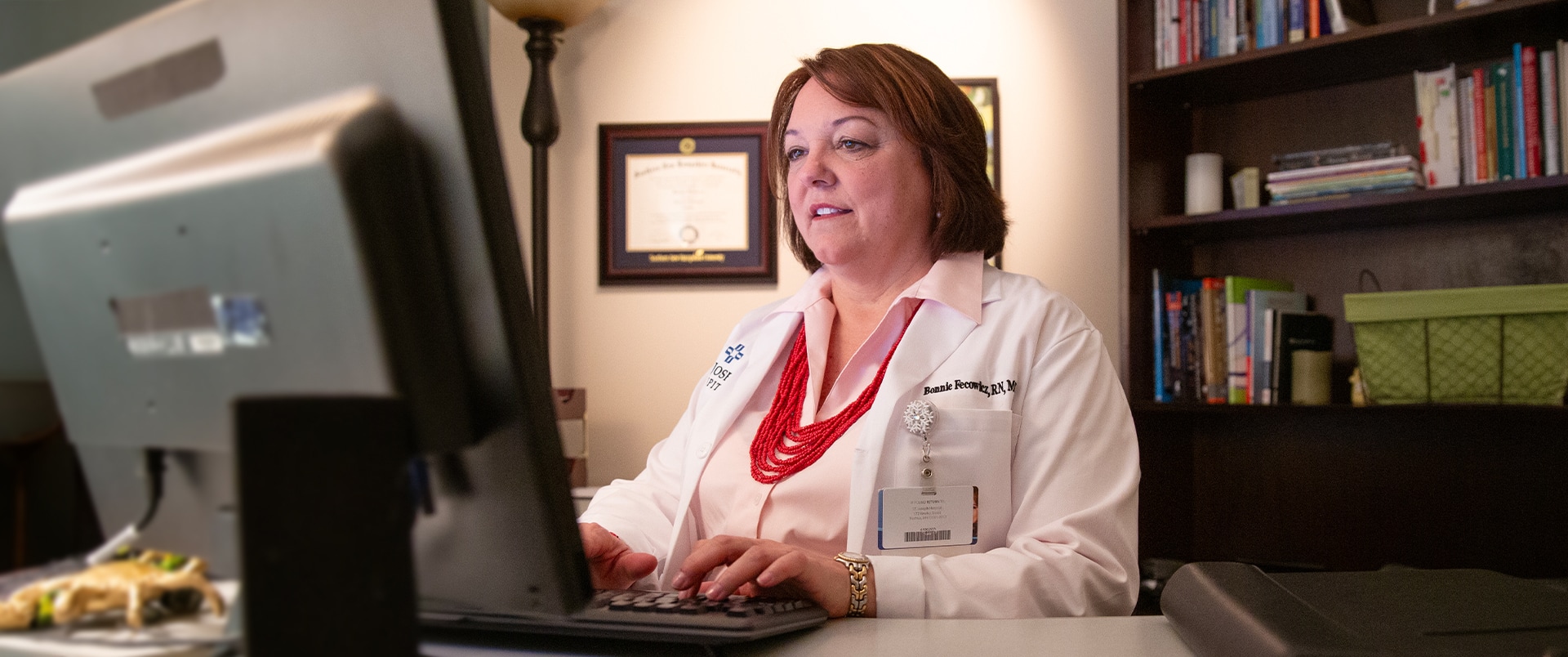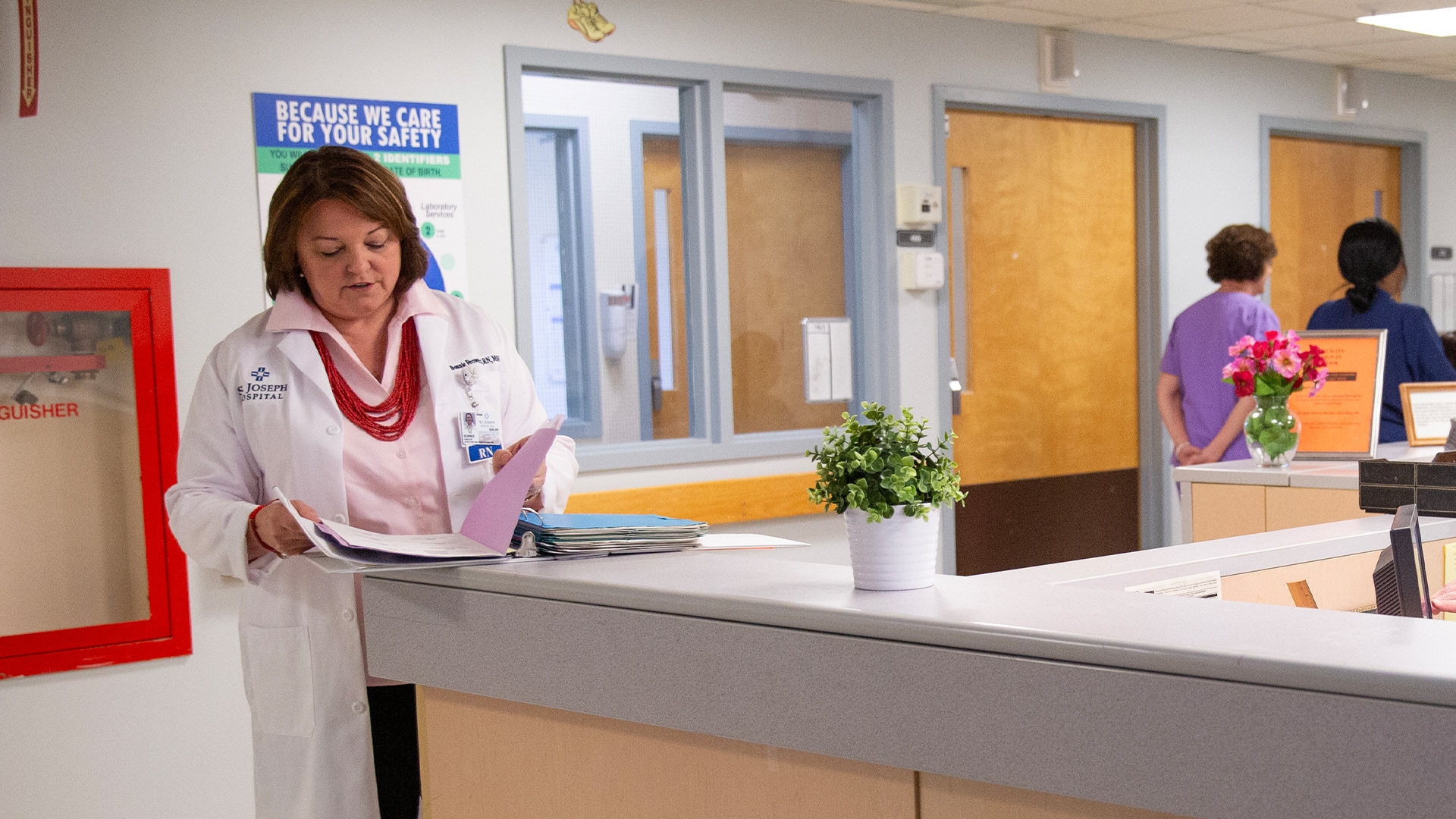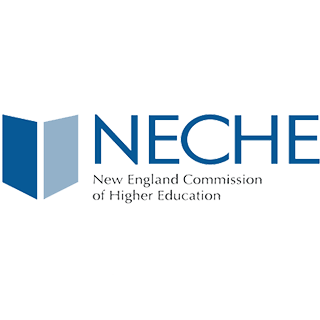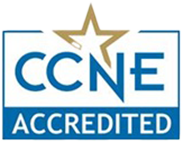SNHU Joins Sigma, Global Nursing Honor Society
Health | 2min Read

Combine your clinical expertise and passion for teaching with the online Master of Science in Nursing (MSN) in Nursing Education program at Southern New Hampshire University. This MSN program track can help prepare you to lead and teach future nursing professionals as an academic or clinical nurse educator in major universities, community colleges, hospitals and healthcare organizations.
Already earned your MSN? Check out our online Nursing Education Post-Master's Certificate program.

The online MSN in Nursing Education track is aligned to the core competencies defined by the American Association of Colleges of Nursing and the National League for Nursing. The program provides the essential skills required by registered nurses to either transition into — or meet the requirements of — the nurse educator role. Graduates of the MSN in Nursing Education track meet the educational requirements for the Certified Nurse Educator (CNE) exam offered by the National League for Nursing (NLN).
The MSN in Nursing Education track integrates hands-on learning throughout. You'll be required to complete a practicum experience, helping you apply your skills in an authentic healthcare setting.
The online MSN in Nursing Education program offers an authentic learning experience that develops resume-building skills and knowledge required to teach the next generation of nurses.
Visit the course catalog to view the full MSN in Nursing Education curriculum.
Students enrolled in the MSN program courses are responsible for ensuring they have the minimum system hardware, software and equipment. In addition to the SNHU technology requirements, MSN students should have the following:
For nursing education and population healthcare tracks:
Minimum Specifications:
Additional Information:
Looking to gain professional healthcare experience, even before you graduate? Do it with HEaRT.
Specially designed for learners in healthcare and nursing, HEaRT (Higher Education and Real World Training) is a powerful experiential learning opportunity at SNHU. These online, asynchronous, voluntary experiences help connect students with employers to help solve real-world business problems – so you can be ready to make an impact in your field.
Our no-commitment application can help you decide if SNHU is the right college for you and your career goals. Apply up until 2 days before the term starts!
Upcoming term starts: July 6, 2026 | September 21, 2026
Attending college online at SNHU can be a life-changing experience. In fact, 93.4% of online students would recommend SNHU according to a 2025 survey with 8,718 respondents.

Dr. Crissy Hunter brings over 15 years of higher education experience, having taught at both Boise State University and Sheridan College. Beyond the classroom, she’s deeply involved in volunteer service, working as an RN with Kanakuk Ministries since 2015 and as a disaster health services lead for the American Red Cross since 2020.
Position
Clinical faculty member of graduate nursing programs
Joined SNHU
2019
Education
"Nurse educators play a vital role in the profession of nursing. Regardless of the setting, our primary role is advancing the profession of nursing through education."

Over the course of her career, Dr. Robin Kirschner has served as a heart critical care nurse, director of nursing, clinical nurse educator, academic nurse faculty, senior clinical manager, director of assessment and curriculum for healthcare, and national dean of MSN nursing. She’s received several awards, including the Adda Alexander Leadership in Action Award sponsored by the Arizona Organization for Nurse Leaders and Arizona Action Coalition.
Position
Program Director, MSN
Joined SNHU
2021
Education
You’ll take your courses within SNHU’s Brightspace platform. This is where you’ll find your:

At Southern New Hampshire University, you'll have access to a powerful network of more than 400,000 students, alumni and staff that can help support you long after graduation. Our instructors offer relevant, real-world expertise to help you understand and navigate the field. Plus, with our growing, nationwide alumni network, you'll have the potential to tap into a number of internship and career opportunities.
Recently, SNHU has been nationally recognized for leading the way toward more innovative, affordable and achievable education:
Founded in 1932, Southern New Hampshire University is a private, nonprofit institution with over 250,000 graduates across the country. SNHU is accredited by the regional accreditor New England Commission of Higher Education (NECHE), which advocates for institutional improvement and public assurance of quality.
No application fee. No test scores. And no college essay. Just a simple form with basic information. It’s another way SNHU helps you reach your goals sooner.
It's easy, fast and free.
Whether you're applying for an undergraduate or graduate degree, you’ll fill out a form to verify your previous education experience. As part of our admissions process, we'll help you request transcripts from your previous school(s) to see if you can transfer any credits into your SNHU program! (Also for free!)
MSN Admission Requirements:
No BSN yet? No problem! SNHU offers an accelerated online RN to MSN pathway option that allows eligible registered nurses to achieve their MSN faster and for less money. The RN to MSN accelerated pathway can be applied to all 5 specialty tracks.
SNHU nursing programs are not authorized in the state of Washington or U.S. territories, and we are not accepting students residing in Washington state or U.S. territories into nursing programs at this time. Currently enrolled students who move into the state of Washington or a U.S. territory will not be able to continue in nursing courses until they move out of the state of Washington or the U.S. territory. Prospective students are encouraged to contact an admission counselor, and current students should contact their academic advisor, for more information.
Applicants and students are advised that their success in their chosen program may be dependent on an ability to meet the Nursing Program Health and Technical Requirements (PDF).
After reviewing your official evaluation, you can decide if SNHU is right for you! If you choose to enroll, just pick your start date and get ready for classes to begin.
Talk to an admission counselor: 888.327.SNHU | enroll@snhu.edu
SNHU is accredited by the regional accreditor the New England Commission of Higher Education (NECHE). The university also carries specialized accreditations for some programs.
The baccalaureate degree program in nursing and the master’s degree program in nursing at Southern New Hampshire University are accredited by the Commission on Collegiate Nursing Education, 655 K Street NW, Suite 750, Washington, DC 20001, 202.887.6791.


As a nonprofit university, SNHU offers some of the lowest online tuition rates in the country. And when you work with our Financial Services team, we'll explore ways to help you save even more on your education – and customize a payment plan that works for you.
*before previously earned credits are applied
Tuition rates are subject to change and are reviewed annually.
**Note: Students receiving this rate are not eligible for additional discounts.
Additional costs: Course materials vary by course.
If 3 of your prior learning credits ($659/credit) are accepted toward your master’s degree.
Your remaining tuition cost: $21,747
If 6 of your prior learning credits ($659/credit) are accepted toward your master’s degree.
Your remaining tuition cost: $19,770
If 9 of your prior learning credits ($659/credit) are accepted toward your master’s degree.
Your remaining tuition cost: $17,793
If 12 of your prior learning credits ($659/credit) are accepted toward your master’s degree.
Your remaining tuition cost: $15,816
How we estimate your tuition cost:
We look at the cost per credit multiplied by the number of credits you need to earn for a master's degree. Most master's degrees require 36 credits. SNHU allows you to transfer in up to 12 credits, requiring a minimum of 24 credits to be taken at SNHU. This is only a tuition estimator and doesn't account for other fees that may be associated with your program of choice.
Transfer credits toward your master's degree program at SNHU. If you’ve taken one course or many, we’ll evaluate them for you.
Fill out the FAFSA to see if you’re eligible for grants or work-study. (You could also be offered loans, though you’ll have to pay those back later.)
Earn credits in leadership, technology and more – while taking advantage of an online graduate tuition discount for active-duty service members and spouses.
Getting free money for college – from SNHU or an outside organization – could help you save hundreds or even thousands of dollars.
Bring in credits from popular options like CLEP, Sophia Learning, Google and other common credit for prior learning (CPL) experiences.
Learn how you can save money with tuition reimbursement from your employer.
Take advantage of an online tuition discount through your organization’s partnership with SNHU. Check with your employer to see if your organization partners with us and if you’re eligible for additional tuition savings and partner education benefits.
Jobs for postsecondary nursing instructors and teachers are expected to grow in coming years.1 An MSN in Nursing Education can help prepare you to pursue several roles, from preceptor to simulation coordinator.
The evolving state of healthcare fuels a need for nurse educators — those who can help prepare nurses in a rapidly changing field — now more than ever.
The online MSN in Nursing Education program offers an authentic learning experience that develops resume-building skills and knowledge required to teach the next generation of nurses in a variety of settings.
Teach patient care in classroom and clinical units to experienced nurses and nursing students.
Coordinate and manage the nursing program's simulation and skills lab.
Instruct and evaluate the clinical training of health sciences students.
Evaluate the effectiveness of curriculums established by school boards, states or federal entities.
Oversee student services, academics and faculty research in a specific education department.
Represent the educational needs of nurses and their impact on healthcare equity.
Openings projected each year — on average — for registered nurses through 2032, according to the U.S. Bureau of Labor Statistics.1
Understanding the numbers
When reviewing job growth and salary information, it’s important to remember that actual numbers can vary due to many different factors—like years of experience in the role, industry of employment, geographic location, worker skill and economic conditions. Cited projections are based on Bureau of Labor Statistics data, not on SNHU graduate outcomes, and do not guarantee actual salary or job growth.

This degree will change my life because all I have ever wanted to do was give back to students what was so feely given to me by my professor. I will be able to be that person that goes above and beyond for a student to make that difference that may allow or encourage them to continue on with their education.
Tara Donovan '23G
A master's in nursing education can help position you for a few different career paths.
Primarily, nurse educators can teach in academic or hospital settings. Those who enter the field will educate nurses on the newest processes, standards, technology and safety measures that uphold regulatory requirements and improve patient care.
In the hospital setting, nurse educators support working nurses through on-the-job training. Within academic settings, nurse educators can be found teaching pre-licensure or post-licensure students, helping prepare them for a rewarding career.
The impact of your nursing education MSN, however, will reach far beyond a single job title. As an educator, you'll play a key role in shaping the future of a changing healthcare system.
As the National Academy of Medicine points out, "(Nurse educators) need to be prepared to teach their students about the complex linkages among population health, social determinants of health and health outcomes."3
This, in part, means putting a face to the populations served, becoming more active in local communities and understanding the barriers between individuals and access to healthcare.
Read more: How to Become a Nurse Educator
Salary expectations for those who have earned a master's in nursing education may vary. Several factors, such as experience, setting, geographic location and job role may impact your earning potential.
There are several different types of online master's in nursing options. Nursing education is just one of many possible career tracks. And as the field evolves, plenty of new opportunities are growing with it.
You could, for example, pursue a Master of Science in Nursing (MSN) in healthcare quality and safety, population healthcare or nurse executive leadership or a family nurse practitioner (FNP) degree.
Not sure which path is right for you? No problem. All of SNHU's MSN programs contain the same 5 core courses to start, so you have the option to switch tracks without losing credit. This gives you an opportunity to explore and decide later which direction you'd like to take.
At SNHU, most of our online MSN programs require 36 credits, which is 12 total courses. (The one exception is our MSN - Family Nurse Practitioner track, which requires 51 credits.)
That said, students have the option of taking two courses per term, which is considered full time, or one course per term, which is considered part time. Only you can decide which workload is right for you, but if speed is important to you, the full-time option could be the way to go.
At SNHU, we also understand that your schedule may change term by term, so you can decide as you go what the right balance is for you.
Adding to the flexibility of our programs, our graduate terms are 10 weeks long with 5 term starts per year. The benefits here are two-fold. On one hand, you can keep going with minimal gaps from one term to the next, to keep the momentum. On the other, you can plan ahead when you have week-long breaks between terms to get ready for the next term, or assess whether one course or two is best for your upcoming term.
Learn more about how long it takes to get a master's degree.
Only you can decide if an MSN in nursing education aligns with your professional goals. That said, if your goal is to enter a role that is personally rewarding, with promising prospects for the future, this program could be an excellent pathway to your goals.
The MSN in Nursing Education at SNHU, for example, reflects "innovative teaching and learning practices, best practices in designing curriculum, individualized assessments and the ins and outs of learning through simulation," said Dr. Crissy Hunter, clinical faculty of graduate nursing programs at SNHU.
The program also allows students to take the Certified Nurse Educator exam by the National League for Nursing, which Hunter notes "is a true mark of a prepared nurse educator."
Nurse educators will be instrumental in shaping the future of healthcare. As the needs of the industry evolve, so do the roles and responsibilities of teachers.
1Bureau of Labor Statistics, U.S. Department of Labor, Occupational Outlook Handbook, on the internet, at:
Cited projections may not reflect local and/or short-term economic or job conditions and do not guarantee actual job growth.